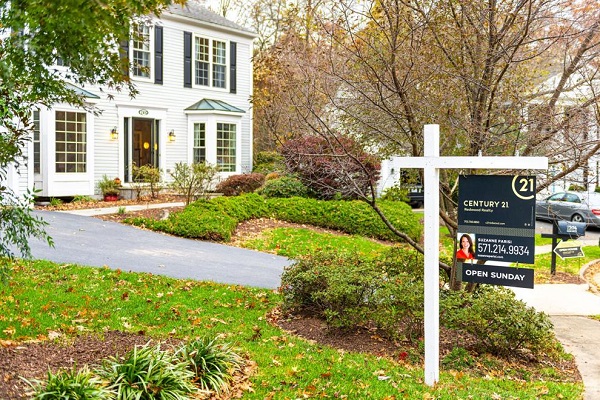Housing
California Senate passes 0 down, 0 payment home ‘loans’ for illegal immigrants

From The Center Square
“With many legal residents not able to afford a home, should we really be giving free cash to illegal immigrants?
The California Senate passed a contentious bill to allow for undocumented immigrants to use the state’s zero-down, zero-interest home “loans” program despite national backlash following coverage of the bill’s looming passage.
With 23 votes for and 11 votes against — including all nine Republicans and Democratic State Sens. Catherine Blakespear, D-Encinitas, and Dave Min, D-Irvine — the bill narrowly passed the 21 vote majority threshold in the Senate.
California’s Dream for All Shared Appreciation Loans program allows applicants to secure “loans” of up to $150,000 or 20% of the home’s purchase price — or, about what a typical down payment is — with zero down payment on this state “loan,” and no payments. In exchange, the state receives the original loan amount plus 20% of the appreciated gain when the home is refinanced, sold, or transferred.
In the last fiscal year, the state allocated $255 million for the program for 1,700 lucky “winners” of an application lottery. KCRA reports that the California Department of Finance confirmed this year, legislators did not appropriate any money for the program, meaning this bill allowing undocumented immigrants to apply would only apply in future years when additional funds are provided. With the state narrowly balancing a $47 billion deficit this year, the state may not be able to allocate funding to this program for some time.
It’s not clear what happens if a family decides to hold on to a home as there are no provisions on how long a property can be held for, which means certain kinds of trusts could potentially allow the loan to not be paid back. Democrats argued those applying for the funds have to work to qualify for mortgages and are thus paying taxes, while Republicans argued the program, which ran out of funds in 11 days, is already overcrowded.
“With many legal residents not able to afford a home, should we really be giving free cash to illegal immigrants? Every dollar that goes to an illegal immigrant is one less dollar available to legal residents including veterans, teachers, and families,” said California Senate Minority Leader Brian Jones, R-San Diego, in a statement. “California already spends $5 billion per year on free healthcare for illegal immigrants—will it ever be enough for Democrats’ political agendas?”
AB 1840, which has now passed both the California Senate and Assembly, must now pass back again in the Assembly with the Senate’s amendments before the end of the legislative session on Aug. 31 before going to California Gov. Gavin Newsom’s desk for approval.
Kenneth Schrupp
Reporter
Energy
A look inside the ‘floatel’ housing B.C.’s LNG workforce

From Resource Works
Innovative housing solution minimizes community impact while supporting the massive labour force needed for the Woodfibre LNG project.
The Woodfibre LNG project — a national leader in Indigenous partnerships and a cornerstone of global energy security — relies on a large construction workforce that drives economic prosperity across the region. For many of these workers, “home” is a ship.
Refitted from a cruise liner into a dedicated accommodation vessel, or “floatel,” this innovative solution houses up to 600 workers near Squamish, B.C., while keeping pressure off local housing and minimizing the project’s community footprint.
These exclusive images, captured a year ago, offer a rare retrospective look inside the original floatel. MV Isabelle X. With a second accommodation ship, the MV Saga X, recently arrived, this photo essay gives a timely, ground-level view of life aboard: individual cabins, a full-service dining hall, recreation spaces and custom laundry facilities. It’s a glimpse into the offshore dormitory that anchors daily life for the crew bringing this vital energy project to completion.

An arcade room is seen on a “floatel” that Woodfibre LNG plans to use to house 600 construction workers at a liquefied natural gas export facility being built near Squamish, during a media tour in Vancouver, on Thursday, May 9, 2024. The ship arrived in B.C. waters in January after a 40-day journey from Estonia, where it had sheltered Ukrainian refugees, but the District of Squamish council voted three to four against a one-year permit for its use last week.

A dining area is seen on a “floatel” that Woodfibre LNG plans to use to house 600 construction workers at a liquefied natural gas export facility being built near Squamish, during a media tour in Vancouver, on Thursday, May 9, 2024. The ship arrived in B.C. waters in January after a 40-day journey from Estonia, where it had sheltered Ukrainian refugees, but the District of Squamish council voted three to four against a one-year permit for its use last week.

A cabin is seen on a “floatel” that Woodfibre LNG plans to use to house 600 construction workers at a liquefied natural gas export facility being built near Squamish, during a media tour in Vancouver, on Thursday, May 9, 2024. The ship arrived in B.C. waters in January after a 40-day journey from Estonia, where it had sheltered Ukrainian refugees, but the District of Squamish council voted three to four against a one-year permit for its use last week.

Bridgemans Services Group president Brian Grange stands at the stern on a renovated cruise ship known as a “floatel” that Woodfibre LNG plans to use to house 600 construction workers at a liquefied natural gas export facility being built near Squamish, during a media tour in Vancouver, on Thursday, May 9, 2024. The ship arrived in B.C. waters in January after a 40-day journey from Estonia, where it had sheltered Ukrainian refugees, but the District of Squamish council voted three to four against a one-year permit for its use last week.

A custom built heat pump unit that allows the ship to avoid using diesel while docked and at anchor is seen on a “floatel” that Woodfibre LNG plans to use to house 600 construction workers at a liquefied natural gas export facility being built near Squamish, during a media tour in Vancouver, on Thursday, May 9, 2024. The ship arrived in B.C. waters in January after a 40-day journey from Estonia, where it had sheltered Ukrainian refugees, but the District of Squamish council voted three to four against a one-year permit for its use last week.

The main entry and exit area for workers is seen on a “floatel” that Woodfibre LNG plans to use to house 600 construction workers at a liquefied natural gas export facility being built near Squamish, during a media tour in Vancouver, on Thursday, May 9, 2024. The ship arrived in B.C. waters in January after a 40-day journey from Estonia, where it had sheltered Ukrainian refugees, but the District of Squamish council voted three to four against a one-year permit for its use last week.

A renovated cruise ship known as a “floatel” that Woodfibre LNG plans to use to house 600 construction workers at a liquefied natural gas export facility being built near Squamish, is seen at anchor in the harbour in Vancouver, on Thursday, May 9, 2024. The ship arrived in B.C. waters in January after a 40-day journey from Estonia, where it had sheltered Ukrainian refugees, but the District of Squamish council voted three to four against a one-year permit for its use last week.

A tugboat and water taxi are seen docked at a renovated cruise ship known as a “floatel” that Woodfibre LNG plans to use to house 600 construction workers at a liquefied natural gas export facility being built near Squamish, at anchor in the harbour in Vancouver, on Thursday, May 9, 2024. The ship arrived in B.C. waters in January after a 40-day journey from Estonia, where it had sheltered Ukrainian refugees, but the District of Squamish council voted three to four against a one-year permit for its use last week.
All photos credited to THE CANADIAN PRESS/Darryl Dyck
Resource Works News
Business
Recent price declines don’t solve Toronto’s housing affordability crisis

From the Fraser Institute
By Jake Fuss and Austin Thompson
House prices in Toronto are declining. But the city’s affordability crisis is far from over—and government policies will likely make it worse.
While most Torontonians know there’s a crisis, the numbers make it clear. According to our new study, in 2023 (the latest year of available data), a family earning the city’s median after-tax income ($60,510) had to save $216,240 (the equivalent of 42.9 months of its after-tax income) for a 20 per cent downpayment on a typical home of any type (single-detached, semi-detached, condominium). But even if that family could somehow clear this monumental hurdle, it then had to dedicate 110.2 per cent of its after-tax income for monthly mortgage payments ($5,557)—a financial impossibility, unless the family can share housing costs (e.g. live-in tenants) or rely on financial support from elsewhere.
At this point, some long-time Toronto residents might recall their own difficult home purchase and think, “Hasn’t it always been this bad?” But just a decade ago, the hurdles weren’t nearly as high.
For example, in 2014 in Toronto, a 20 per cent downpayment cost 26.4 months of median after-tax family income—not 42.9 months. And the monthly mortgage payment on a typical home purchase required 56.0 per cent of median after-tax family income—not 110.2 per cent. So yes, typical homes have been broadly unaffordable for median-income-earning Toronto families for years, but it’s way worse now.
For Torontonians priced out of homeownership, renting has not offered much relief. In 2023, Toronto had the least affordable rents in Canada. The monthly cost of the median rental unit was $1,750, equal to 34.7 per cent of the median after-tax family income. That’s up from $1,110 (or 27.7 per cent of after-tax income) in 2014.
Fast-forward to today, and Torontonians should view reports of “crashing” home prices in the proper context. Typical home prices peaked at $1.27 million in the first quarter of 2022. By the second quarter of 2025, they had fallen to $1.00 million. That’s a marked decline, but prices remain well above pre-pandemic levels and far beyond the reach of most typical families.
And while the fall in house prices hasn’t been enough to restore affordability, it has caused a steep contraction in homebuilding as builders take a more cautious approach to development at a time when the city still needs more new homes to improve affordability.
This unhealthy dynamic, where price declines weigh heavily on housing construction, is made worse by government policy. Despite hundreds of millions of taxpayer dollars spent on housing initiatives by the federal government, the Ford government and Toronto City Hall, key provincial and municipal policies continue to impose needless costs and restrictions on new housing.
For example, Toronto homebuilders must endure costly wait times of more than two years for municipal approvals—more than three times longer than in Vancouver and seven times longer than in Edmonton. New high-rise developments in Toronto face municipal charges of $134,900 per unit compared to $38,100 in Ottawa and $6,900 in Edmonton. Meanwhile, the Ford government has backed away from several critical recommendations from its own Housing Task Force, which would make it easier to build more and denser housing, such as allowing fourplexes provincewide without special approval.
Of course, federal immigration policy, particularly over the last five years, has increased demand for new homes in Toronto and across the country. But even so, if not for lengthy approval processes, sky-high fees and restrictive land-use policies, many more new homes would be built in Toronto today despite declining prices. Homes only get built when buyers can cover the cost of construction plus a reasonable return on investment for developers. But when governments drive up costs, increase uncertainty and claim a significant share of the final sale price through fees and charges, projects that might otherwise proceed can become financially unviable. The result is less new housing, fewer options for buyers and a slower path to improved affordability.
To help improve housing affordability, Toronto needs a steady flow of new homebuilding. Torontonians should demand faster approvals, lower fees and more sensible rules on what types of homes can be built.
-

 Bruce Dowbiggin2 days ago
Bruce Dowbiggin2 days agoIntegration Or Indignation: Whose Strategy Worked Best Against Trump?
-

 International2 days ago
International2 days agoFBI may have finally nabbed the Jan. 6 pipe bomber
-

 Business2 days ago
Business2 days agoCarney’s Toronto cabinet meetings cost $530,000
-

 espionage2 days ago
espionage2 days agoDigital messages reportedly allege Chinese police targeted dissident who died suspiciously near Vancouver
-

 MAiD2 days ago
MAiD2 days ago101-year-old woman chooses assisted suicide — press treats her death as a social good
-

 Business1 day ago
Business1 day agoOil tanker traffic surges but spills stay at zero after Trans Mountain Expansion
-

 COVID-191 day ago
COVID-191 day agoUniversity of Colorado will pay $10 million to staff, students for trying to force them to take COVID shots
-

 Censorship Industrial Complex2 days ago
Censorship Industrial Complex2 days agoJustice Centre campaigning Canadian provinces to follow Alberta’s lead protecting professionals








